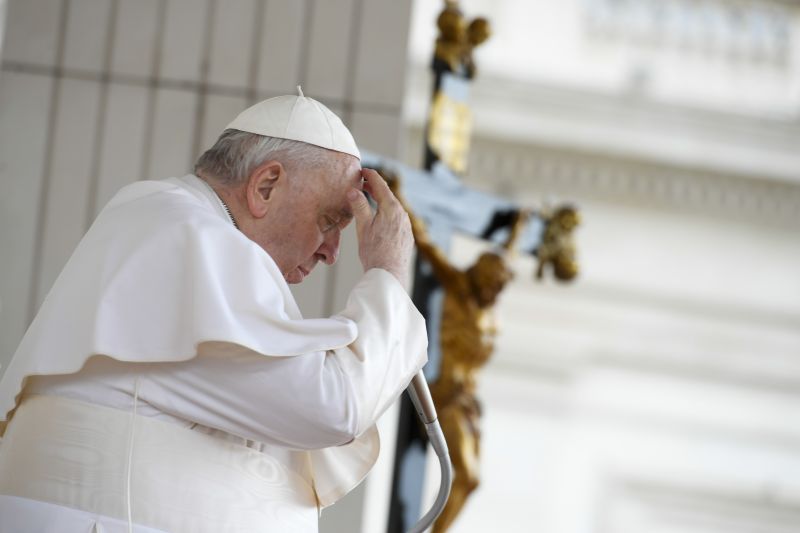Vance leads prayer for Pope Francis at National Catholic Prayer Breakfast

 U.S. Vice President JD Vance waves to the crowd at the 2025 National Catholic Prayer Breakfast on Feb. 28, 2025, in Washington, D.C. / Credit: EWTN News/Screenshot
U.S. Vice President JD Vance waves to the crowd at the 2025 National Catholic Prayer Breakfast on Feb. 28, 2025, in Washington, D.C. / Credit: EWTN News/Screenshot Washington D.C., Feb 28, 2025 / 18:15 pm (CNA).
U.S. Vice President JD Vance led attendees at the 2025 National Catholic Prayer Breakfast in a prayer for Pope Francis’ health after speaking about his own conversion to the Catholic faith and the goals of President Donald Trump’s administration.
“Almighty and generous God, we thank you for your charity,” Vance began his prayer during his address Friday at the Walter E. Washington Convention Center in Washington, D.C.
“Please grant your mercy upon Pope Francis so he may be restored from sickness and guide us in watchful care,” he continued. “We pray that you bless our Holy Father’s doctors, nurses, and medical staff with wisdom and capabilities so you may work through them to renew the health of your shepherd. Through Christ Our Lord, Amen.”
The prayer comes as the pontiff has spent the past two weeks in the hospital in a critical — yet stable — condition. The pope is suffering from pneumonia and other respiratory problems.
Vance, who is the second Catholic vice president, spoke about his admiration for Pope Francis, calling him “a great pastor,” and quoted at length from one of the pontiff’s homilies in March 2020 during the then-emerging COVID-19 pandemic.
The vice president recalled the homily, saying: “I think all of us can remember that moment of the Holy Father standing in an empty St. Peter’s Square, holding the Eucharist above his head and giving a sermon that I return to consistently because it was incredibly meaningful to me at the time and remains meaningful today.”
During the homily, the pope spoke about the Gospel reading of the fourth chapter of the Gospel of Mark, which details Christ’s calming of a storm when he and his disciples were at sea. The Holy Father compared the storm described in the passage to the uncertainty surrounding the pandemic.
“Like the disciples in the Gospel, we were caught off guard by an unexpected, turbulent storm,” Vance quoted from the homily.
During his speech, Vance also acknowledged some disagreements the pope and the United States Conference of Catholic Bishops have expressed about the Trump administration’s immigration policies. He vowed that the administration “will always listen to people of faith and people of conscience” even when there are disagreements about policy.
“My goal here is not to litigate with [the pope] or any other clergy member about who’s right and who’s wrong,” he said. “You obviously know my views, and I will speak to them consistently because I think that I have to do it because it serves the best interest of the American people.”
“I think a lot of conservative Catholics are too preoccupied with their political criticisms of a particular clergy member or the leader of the Catholic Church,” the vice president said. “And, of course, I’m not telling you that you’re wrong, because sometimes I even agree with you. I think that what I would say is that it’s not in the best interest of any of us to treat religious leaders of our faith as just another social media influencer.”
Vance added that he and his children pray for the pope every day.
“I believe that the pope is fundamentally a person who cares about the flock of Christians under his leadership,” Vance continued. “And he’s a man who cares about the spiritual direction of the faith.”
Vance discusses his conversion
The vice president also spoke about his 2019 conversion to Catholicism and referred to himself as a “baby Catholic” who is still new to the faith, noting that “there’s a lot I don’t know.”
“I try to be humble as best I can when I talk about faith publicly because of course I’m not always going to get it right,” he said. “And I don’t want my inadequacies in describing our faith to fall back on the faith itself.”
Vance asked people to recognize that when he speaks about his faith, “it comes from a place of deep belief.” He said, however, to also recognize he does “not always [know] everything all the time.”
“What attracted me to the Christian faith and what attracted me to this Church in particular is the recognition that grace is not something that happens instantaneously,” the vice president added. “It’s something that God works in us over a long period of time, sometimes many years and sometimes many decades.”
Vance said grace is “very much a process,” which “makes us closer to him and makes us better people in the process.” He said the accountability of the sacrament of reconciliation has helped him become more consistent with attending weekly Mass.
“While I’m as imperfect a Christian as any person in this room, I really do feel that God is transforming me every single day, and that’s one of the great blessings of our faith and one of the great blessings of following the sacraments as I try to do,” the vice president said.
Vance also noted that he is in an interfaith marriage. His wife, Usha Vance, is Hindu but attends Mass with him and their children weekly. He said he is raising his children Catholic but has made an agreement with his wife to hold off on baptizing the children until they decide to get baptized on their own.
The vice president said his 7-year-old son’s decision to be baptized in November 2024 was one of his “proudest” moments as a father.
Trump administration goals
The vice president also said the goal of the Trump administration is ultimately to “promote the common good.”
“The real measure of health in a society is the safety and stability and the health of our families and of our people,” Vance asserted.
“Between protecting the rights of pro-life protesters, between ensuring that we have an opportunity to protect the rights of the unborn in the first place, and importantly protecting the religious liberty of all people — but in particular, Catholics — I think that we can say that President Trump, though not a Catholic himself, has been an incredibly good president for Catholics in the United States of America,” the vice president declared to loud applause.
Vance added that Trump has “pursued a path of peace” on matters of foreign policy. He said that American “foreign misadventures” have been an impediment to religious freedom globally but that Trump’s efforts “to bring peace” are oriented toward “saving lives and carrying out one of Christ’s most important commandments.”
Additionally, the vice president referred to the administration’s efforts of economic prosperity as a “means to an end,” with that end being “the flourishing, hopefully, of the life of every single citizen.”
“We care about prosperity so we can promote the common good of every citizen of the United States of America,” Vance said.






